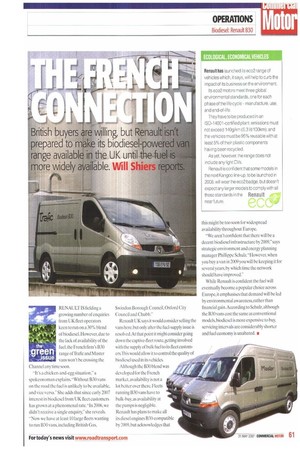British buyers are willing, but Renault isn prepared to make
Page 61

If you've noticed an error in this article please click here to report it so we can fix it.
its biodiesel-powered v 'range available in the UK until the fuel is more widely available. Will re .o
RENAULT IS fielding a growing number of enquiries from UK fleet operators keen to run on a 30% blend of biodiesel. However, due to the lack of availability of the fuel. the French firm's B30 range of Trafic and Master vans won't be crossing the Channel any time soon.
"It's a chicken-and-egg situation," a spokeswoman explains."Without B30 vans on the road the fuel is unlikely to be available, and vice versa." She adds that since early 2007 interest in biodiesel from UK fleet customers has grown at a phenomenal rate. "in 2006, we didn't receive a single enquiry," she reveals. "Now we have at least 10 large fleets wanting to run B30 vans. including British Gas, Swindon Borough Council, Oxford City Council and Chubb."
Renault UK says it would consider selling the vans here, but only after the fuel-supply issue is resolved.At that point it might consider going down the captive-fleet route, getting involved with the supply of bulk fuel to its fleet customers.This would allow it to control the quality of biodiesel used in its vehicles.
Although the B30 blend was developed for the French market, availability is not a lot better over there. Fleets running B30 vans have to bulk-buy, as availability at the pumps is negligible. Renault has plans to make all its diesel engines B30-compatible by 2009, but acknowledges that this might be too soon k)r widespread availability throughout Europe.
-We aren't confident that there will be a decent biodiesel infrastructure by 2009," says strategic environment and energy planning manager Phillippe Schulz. "However, when you buy a van in 2009 you will be keeping it for several years. by which time the network should have improved."
While Renault is confident the fuel will eventually become a popular choice across Europe, it emphasises that demand will be led by environmental awareness, rather than financial gain.According to Schulz, although the B30 vans cost the same as conventional models, biodiesel is more expensive to buy, servicing intervals are considerably shorter and fuel economy is unaltered. •






















































































































































































